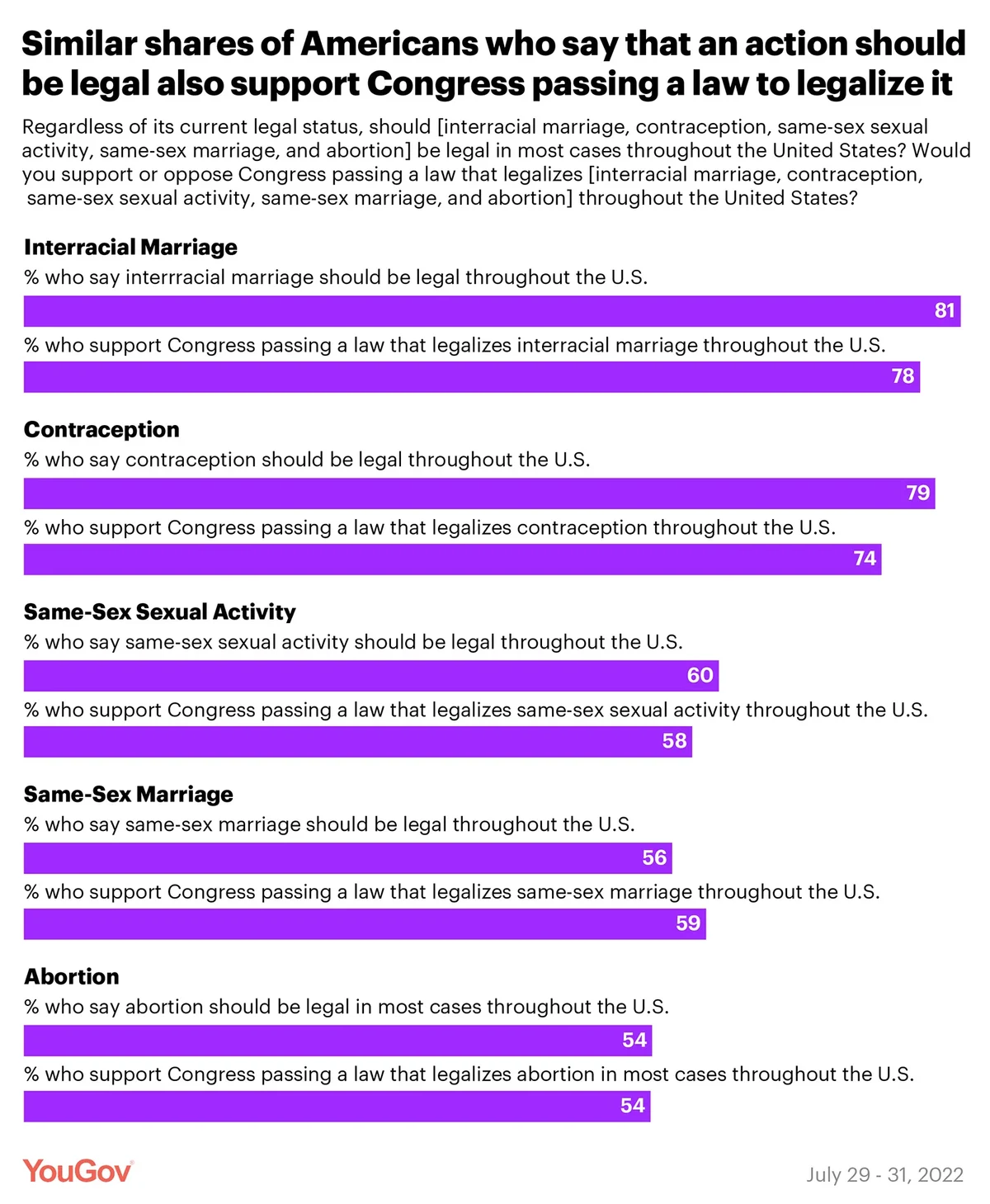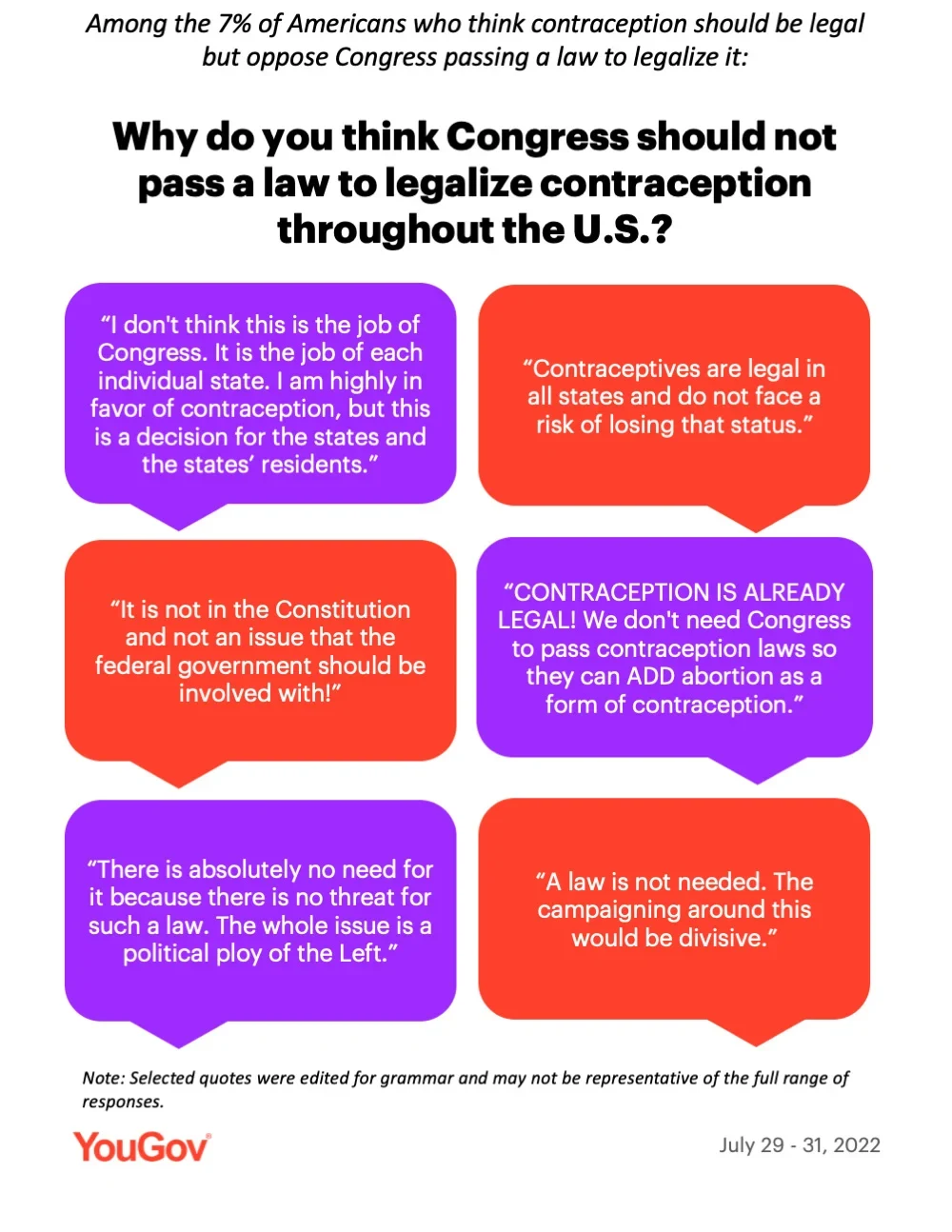Since the Supreme Court overturned its Roe v. Wade decision and ended the constitutional right to abortion access, Democrats in Congress have attempted to pass national legalization for certain actions that were once protected by Court decisions. Such legislation has focused on abortion, contraception, same-sex marriage, and interracial marriage. A new YouGov poll sought to determine if there are any gaps between the share of Americans who generally want individual policies to be legal nationwide and the share who support Congress in passing a law to ensure they remain legal.
Generally, the same share of Americans who say that a certain action should be legal also support Congress passing a law making the action legal throughout the United States. For instance, there is no significant difference between the share of Americans who say that same-sex marriage should be legal throughout the country (56%) and the share who say Congress should pass a law that legalizes same-sex marriage nationwide (59%). The same pattern is seen for questions asking whether abortion, same-sex sexual activity, interracial marriage, and contraception should be legal, and for corresponding questions asking whether Congress should ensure each of those actions' legality.

That pattern holds true for Democrats, Independents, and Republicans on certain issues. There is little or no difference between the share of each party who believes the issues of abortion, same-sex sexual activity, and same-sex marriage should be legal in most cases and the share who wants Congress to take action to make that happen.
The largest disparities come from Republicans and Independents, on their support for the legalization of contraception and interracial marriage, and whether Congress should pass a law to legalize those actions. For example, 81% of Republicans say that interracial marriage should be legal throughout the United States, but only 71% of Republicans say Congress should pass a law that ensures it stays legal. Independents have a similar gap: 83% say interracial marriage should be legal, but only 74% support Congress passing a law to legalize it.
Only about two-thirds of Republicans (68%) say both that interracial marriage should be legal and that Congress should pass a law to ensure it remains legal — compared to 71% of Independents and 77% of Democrats. Republicans (13%) and Independents (12%) are more likely than Democrats (4%) to say both that interracial marriage should be legal and that they either oppose or are not sure about Congress passing a law legalizing it.
When it comes to contraception, there’s a similar pattern. Three-quarters of Republicans (77%) say that contraception should be legal, but only 68% want Congress to pass a law that legalizes contraception throughout the U.S. Independents have a 10-point gap on the issue: 82% support contraception being legal, but only 72% want Congress to act.
On contraception, 62% of Republicans say both that contraception should be legal and that Congress should pass a law to formally legalize it, compared to 70% of Independents and 72% of Democrats. Republicans (15%) and Independents (12%) are more likely than Democrats (6%) to say both that contraception should be legal, but that they either oppose or are not sure about Congress passing a law legalizing it.
To understand why some Americans may support an action being legal, but not want Congress to act to establish its legality, YouGov asked in an open-ended question why people who supported the idea of the action being legal did not want it legalized by Congress. On the topic of contraception, people who support contraception access but do not want Congress to pass a law for it nationally generally say that contraception is not at risk or that it’s an issue for states to decide. A few specifically reference the 10th Amendment (which says that powers not delegated to the United States by the Constitution are reserved to the states). These responses were similar across each of the topics asked about in an open-ended question, which were abortion, same-sex marriage, and contraception.

Related: How Americans feel about abortion, according to dozens of polls
This poll was conducted on July 29 - 31, 2022 among 1,000 U.S. adult citizens. Explore more on the methodology and data for this poll.
Image: Adobe Stock by doganmesut














